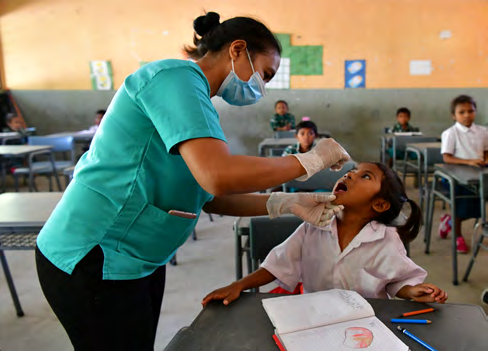.tmb-768v.png?Culture=en&sfvrsn=54737d84_1)
Maintaining immunization coverage during the COVID-19 pandemic
Key Learning Points
• The value of credible and respected leadership: The provision of clear and credible guidance on the need to continue immunization services by professionals respected by the health community (including the NITAG Chair, DGHS, senior Paediatricians) built confidence in vaccinators for providing safe services.
• The value of supportive supervision: Re-purposing WHO technical staff to work closely with district immunization coordinators has been invaluable in building trust and competence for health workers to deliver vaccination.
• The value of user-friendly granular data to target interventions: Districts provided weekly coverage data, disaggregated to the CHC level. This facilitated identification of poor performing health facilities that were provided extra technical support and supervision to improve performance.
• The value of door-to-door campaigns to reach the unreached: The intensive infection control training provided health workers with confidence to provide outreach for non-attenders, take immunization to the door-step and significantly improving coverage rates.
How has COVID-19 impacted essential health services in Timor-Leste?
Essential health services have been adversely affected across a number of different areas as a result of the COVID-19 pandemic. In particular, immunisation coverage was significantly disrupted in April 2020, with a 30% drop in coverage compared to the same month in the previous year.
Attendance at fixed immunization clinics dropped significantly due to anxiety and fear of contracting COVID-19 from clinic visits. This was compounded by restrictions on public transport. In addition, vaccinators were reluctant to offer immunization sessions due to safety concerns around contracting COVID-19.

An outreach vaccinator at a school in Aimutin in Dili municipality identifying and vaccinating children who missed immunization doses during the state of emergency due to the COVID-19 pandemic. Photo Credit: ©WHO/SHOBHAN
What was the intervention to mitigate this impact?
A robust, targeted and data-driven response was mounted to address falling immunization coverage across all 13 districts of Timor-Leste.
The response involved a series of interventions introduced by the Ministry of Health in close technical and logistical collaboration with WHO and other partners. This included adapting the WHO operational guidance on maintaining essential health services during an outbreak, to suit the Timor-Leste context.
Key strategies included:
• High level strategic meetings between the Ministry of Health and the National Immunization Technical Advisory Group (NITAG), facilitated by the technical partners.
• Re-purposing of WHO technical staff for supportive supervision of EPI coordinators in all 13 districts.
• A high impact campaign to ensure health workers delivered vaccinations safely and effectively, whilst protecting themselves and their communities.
• Developing a simple, user-friendly format for weekly reporting of granular coverage data down to Community Health Centre (CHC) level.
• Utilising data to identify poorly performing CHCs so that extra support, resources and supportive supervision could be targeted.
• Improving coverage by conducting door-to-door outreach to identify and immunize children that did not attend fixed clinics.
How did this intervention help in the maintenance of essential health services?
What were the key challenges involved?
• Attendance at fixed immunization clinics dropped significantly due to anxiety and fear of catching the virus from clinic visits. This was compounded by restrictions on public transport. These demand side barriers were overcome by strengthening community outreach – including immunization sessions at home for families that were unable to attend.
• Vaccinators were reluctant to offer immunization sessions due to safety concerns around contracting COVID-19. Initially, this proved to be the most significant supply side obstacle. Mentoring and supportive supervision by technical leads that had the respect and trust of frontline workers helped overcome this.


